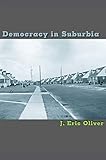Democracy in Suburbia / J. Eric Oliver.
Material type: TextPublisher: Princeton, NJ : Princeton University Press, [2021]Copyright date: ©2001Description: 1 online resource (282 p.) : 24 tables, 36 line illus., 5 mapsContent type:
TextPublisher: Princeton, NJ : Princeton University Press, [2021]Copyright date: ©2001Description: 1 online resource (282 p.) : 24 tables, 36 line illus., 5 mapsContent type: - 9780691223360
- Local government -- United States
- Political participation -- United States
- Segregation -- United States
- Social stratification -- United States
- Suburban life -- United States
- Suburbs -- United States
- POLITICAL SCIENCE / Political ideologies / Democracy
- Aristotle
- Atlanta (Georgia)
- Black Panthers
- Bobo, Lawrence
- Brehm, John
- Camden (New Jersey)
- Celebration (Florida)
- Census of Governments (1987)
- Cisneros, Henry
- Danielson, Michael
- Dixmoor (Illinois)
- Downs, Anthony
- Duany, Andres
- Ehrenhalt, Alan
- FIPS codes (Census Bureau)
- Fair Housing Act (1968)
- Frantz, Douglas
- Garreau, Joel
- Green Guerillas (NYC)
- Guterbock, Thomas
- Huckfeldt, Robert
- Insight Meditation Society (Boston)
- Jackson, Kenneth
- Kerner Commission (1968)
- Langdon, Philip
- Levitt, Abraham
- London, Bruce
- Mansbridge, Jane
- Mount Vernon (New York)
- Organization Man (Whyte)
- Pateman, Carole
- Plater-Zyberk, Elizabeth
- Rusk, David
- Russo, Anthony
- Rybczynski, Witold
- Stone, Clarence
- Taylor, Marylee
- Tufte, Edward
- altruistic behavior
- city manager government
- civic capacity perspective
- civic voluntarism model
- classical liberal assessment
- edge cities
- ethnic identity
- growth machine model
- mayor-council governments
- political party patronage
- political struggle
- public works
- rational choice theory
- urban political machines
- voluntary organizations
- 320.8/5/0973 21
- JS391
- JS391 .O44 2001
- online - DeGruyter
| Item type | Current library | Call number | URL | Status | Notes | Barcode | |
|---|---|---|---|---|---|---|---|
 eBook
eBook
|
Biblioteca "Angelicum" Pont. Univ. S.Tommaso d'Aquino Nuvola online | online - DeGruyter (Browse shelf(Opens below)) | Online access | Not for loan (Accesso limitato) | Accesso per gli utenti autorizzati / Access for authorized users | (dgr)9780691223360 |
Frontmatter -- Contents -- Maps and Figures -- Tables -- Acknowledgments -- CHAPTER ONE The Rise of a Suburban Demos -- CHAPTER TWO All Cities Great and Small -- CHAPTER THREE Cities of Riches and Squalor -- CHAPTER FOUR The Civic Paradox of Racial Segregation -- CHAPTER FIVE A Bedroom Polis -- CHAPTER SIX Boomtowns and the Civic Costs of Air-Conditioning -- CHAPTER SEVEN Reform Governments and Their Aftermath -- CHAPTER EIGHT Remaking the Democratic Metropolis -- APPENDIX A The Citizen Participation / Census Dataset -- APPENDIX B Logistic and OLS Regression Equations for the Figures -- APPENDIX C Testing the Relationship between Civic Participation and “Self-Interest Rightly Understood” -- References -- Index
restricted access online access with authorization star
http://purl.org/coar/access_right/c_16ec
Suburbanization is often blamed for a loss of civic engagement in contemporary America. How justified is this claim? Just what is a suburb? How do social environments shape civic life? Looking beyond popular stereotypes, Democracy in Suburbia answers these questions by examining how suburbs influence citizen participation in community and public affairs. Eric Oliver offers a rich, engaging account of what suburbia means for American democracy and, in doing so, speaks to the heart of widespread debate on the health of our civil society. Applying an innovative, unusually rigorous mode of statistical analysis to a wealth of unique survey and census data, Oliver argues that suburbs, by institutionalizing class and racial differences with municipal boundaries, transform social conflicts between citizens into ones between political institutions. In reducing the incentives for individual political participation, suburbanization has negated the benefits of ''small town'' government and deprived metropolitan areas of valuable civic capacity. This ultimately increases prospects of serious social conflict. Oliver concludes that we must reconfigure suburban governments to allow seemingly intractable issues of common metropolitan concern to surface in local politics rather than be ignored as cross-jurisdictional. And he believes this is possible without sacrifice of local government's advantages. Scholars and students of political science, sociology, and urban affairs will prize this book for its striking findings, its revealing scrutiny of the commonplace, and its insights into how the pursuit of the American dream may be imperiling American democracy.
Mode of access: Internet via World Wide Web.
In English.
Description based on online resource; title from PDF title page (publisher's Web site, viewed 07. Nov 2022)


